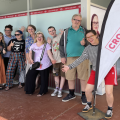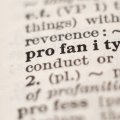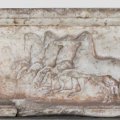The relevance of the modern Olympic Games – from war truces to the celebration of athletes - will come under scrutiny at a meeting of Olympics scholars that starts today.
The University of Queensland is hosting the three-day conference Olympic Athletes: Ancient and Modern to discuss the winners, sporting events, history and also modern relevance of the world’s most celebrated sporting event that can be traced back to 776BC in ancient Greece.
The conference opens at the R.D. Milns Antiquities Museum at 5.30pm, with a public lecture by Professor Mark Golden from the University of Winnipeg.
Professor Golden will talk on the concept of the modern Olympic Games as a means of fostering peace among people, referring to the ancient Olympic truce that halted wars to allow safe passage for those travelling to take part in the games.
Conference organiser Dr Tom Stevenson from the UQ School of History, Philosphy, Religion and Classics said the conference would allow researchers from around the world to analyse the Olympic experience of athletes from the ancient and the modern games.
“We’ll be asking what is so special about Olympic competition and Olympic athletes, as well as who were or are the great Olympic athletes and why?” he said.
Dr Janette McWilliam, also from the school, said many countries now send athletes to the Olympics because sport was an important part of their national identity and a measure of cultural achievement.
“We can learn a lot about social and cultural values, and national identity from studying the games in the ancient world as well as the modern,” she said.
International guests also include Professor Matthew Trundle from The University of Auckland, who will speak on the concept of athletes as warriors, and Professor Christoph Ulf from the German University of Innsbruck who has contributed a study on the societal pressures that may have caused ancient athletes to compete as a “cultural actor”.
Other papers contributed include research on Milo of Croton as “the most illustrious of athletes”, comparisons of victory celebration, and the modern focus on striving as opposed to winning.
One of the highlights of the conference will be a chaired session on Sunday at 11am, featuring discussions on the modern Olympics and its champions.
Panelists include:
- Lara Davenport (2008 Australian gold medalist in the 4 x 200-metre freestyle relay),
- Professor David Theile (1956 and 1960 Australian gold medalist in the 100-metre backstroke)
- Emeritus Professor Max Howell (1946-8 Wallaby and member of UQ’s School of Human Movement Studies).
Further details are available here.
The conference is proudly sponsored by The School of History, Philosophy, Religion and Classics, The Friends of Antiquity, Alumni Friends of the University of Queensland, Inc., The Queensland Friends of the Australian Archaeological Institute at Athens, and The Australasian Society for Classical Studies.
Conference enquiries: Tom Stevenson (t.stevenson@uq.edu.au or ph: 07 3365 3143).
MEDIA: Dania Lawrence (07) 3365 9163 or d.lawrence@uq.edu.au).
Background
The Olympic Games have a long history. The first Olympic victor list dates back to 776 BC when competitions were held in honour of Zeus on the Altis of Olympia in Greece.
The original contest was held during a religious festival held in honour of the God Zeus. The one sporting event was the stadion, a sprint of about 200m. Other events, such as chariot races and horse races, were added between the late 8th and 5th centuries BC.
In the 5th century BC the Festival at Olympia lasted five days and athletes travelled from around the world to compete. The festival began at Elis, the host city, with a procession to Mount Olympia and a sacrifice of a hecatomb on the great altar of Zeus. This was followed by a ceremony at which athletes and officials swore an oath to observe the rules of the games.
From 472 BC the main sacrifice was preceded by the pentathlon and chariot/horse-races. After the main sacrifice boys' contests, men's foot-races, wrestling, boxing, pankration were held. The final event was a footrace-race in armour.
UQ students can learn more about games and sport in the Ancient World, including: ANCH3020 Special Topic In Greek History will focus on War and Games in Ancient Athens, ANCH2500 Ancient History and Modern Cinema will examine films such as Gladiator, 2013 Gladiatorial Games in the Roman world will be a part of ANCH2280 Roman Society and Civilization
.jpg)










